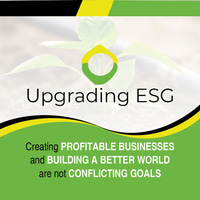Corporate Sustainability Reporting Directive (CSRD)
Large companies are required to ensure their sustainability reports are externally assured by auditors. The first sustainability reports under the CSRD framework are expected in early 2025, reflecting data from the year 2024. This is a game-changer. This quick read is for companies to wake up to this reality. It will affect any company dealing with European companies. Partnering with qualified sustainability experts will be crucial in this journey.


The Corporate Sustainability Reporting Directive (CSRD) is set to be a game-changer for large and listed companies operating in or dealing with European markets. Beginning in January 2024, these companies must ensure their sustainability reports are externally assured by auditors, with the first reports due in early 2025. This new regulatory framework is a wake-up call for businesses to take their sustainability efforts seriously. It will affect any company dealing with European companies. Partnering with qualified sustainability experts will be crucial in this journey and remain compliant.
Introduction
The Corporate Sustainability Reporting Directive (CSRD) is a pivotal regulation enacted by the European Union to enhance and standardize corporate sustainability reporting. It mandates large and listed companies (excluding listed micro-enterprises) to disclose their social and environmental impacts, risks, and opportunities. This directive aims to provide transparency for investors, civil society organizations, consumers, and other stakeholders, aligning with the objectives of the European Green Deal.
Key Elements of the CSRD
Double Materiality Assessment
Companies must evaluate both financial materiality (impact on the company) and environmental and social materiality (impact of the company on the environment and society).
Stakeholder Engagement
Engaging with stakeholders to understand their concerns and expectations regarding the company's sustainability practices.
Impacts, Risks, or Opportunities (IROs)
Detailed reporting on the impacts, risks, and opportunities related to social and environmental factors.
Strategy, Business Model, and Value Chain
Disclosures on how sustainability is integrated into the company's strategy, business model, and value chain.
Task Force on Climate-related Financial Disclosures (TCFD)
Aligning with TCFD recommendations for climate-related financial disclosures.
Scope 3 Hot-Spotting
Identifying and reporting on significant indirect emissions in the value chain (Scope 3)
Supply Chain Due Diligence
Ensuring sustainability and ethical practices throughout the supply chain.
Climate Transition Action Plans (CTAPs)
Developing and reporting on plans for transitioning to a low-carbon economy.
Input-Output-Outcome Models
Using these models to quantify and report on sustainability impacts
Whistleblower Reporting
Mechanisms for employees and stakeholders to report unethical or non-compliant practices.
Internal Controls
Establishing robust internal controls to ensure the accuracy and reliability of sustainability reports.
Sustainability Matters Addressed by Management and Supervisory Bodies
Involvement of top management and supervisory bodies in sustainability governance.
Compliance and Non-Compliance Penalties
Compliance
Companies are required to ensure their sustainability reports are externally assured by auditors.
The first sustainability reports under the CSRD framework are expected in early 2025, reflecting data from the year 2024.
Non-Compliance
France has set stringent penalties for non-compliance:
Fines up to €75,000 and jail time up to 5 years for obstructing third-party assurance.
Fines up to €30,000 and jail time up to 2 years for failing to get reports audited by a certified entity.
Moving Forward
As the CSRD becomes mandatory, companies need to focus on comprehensive and rational sustainability practices to ensure compliance. This includes:
Conducting thorough double materiality assessments.
Engaging stakeholders effectively.
Identifying and managing social and environmental IROs.
Integrating sustainability into core business strategies.
Adopting recognized frameworks like TCFD.
Ensuring due diligence in supply chains.
Developing robust climate transition plans.
Establishing strong internal controls and whistleblower mechanisms.
Conclusion
The CSRD represents a significant step towards standardized and impactful sustainability reporting. Companies must adapt to these regulatory requirements to not only ensure compliance but also to enhance their sustainability performance and contribute to broader environmental and social goals. Failure to comply, as evidenced by France's stringent penalties, can result in severe legal and financial repercussions for corporate directors.
Do You Want Your Company to Thrive in the Age of Sustainability?
This blog aims to raise awareness about the CSRD and its implications. We invite you to start a conversation about your ESG successes and challenges, and how you can leverage our insights and experience to develop a robust and effective strategy tailored for your organization. Whether you are just beginning your sustainability journey or seeking to refine your current approach, we offer a valuable framework for achieving success.
Take the Next Step Towards Sustainability
If you want your company to thrive in the realm of sustainability, now is the time to act. Start a conversation about upgrading ESG by reaching out via email at Jeffrey@upgradingesg.com or WhatsApp at +972 (0)54 6668182. Together, we can lead your company to a sustainable and prosperous future.
#ESG #Sustainability #ClimateChange #BusinessLeadership #ESGStrategy #CorporateResponsibility #SustainableBusiness #Leadership #CFO #CEO #ESGInsights
